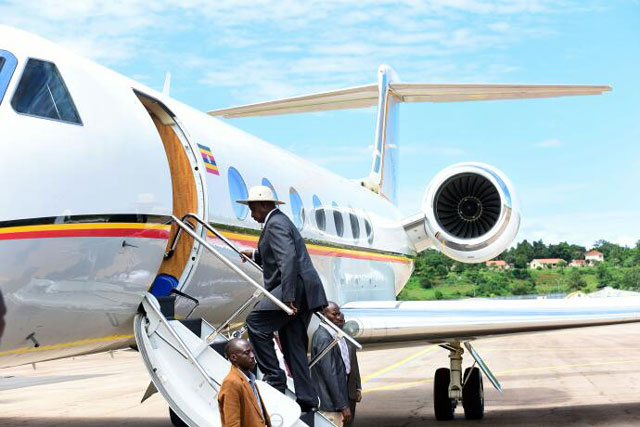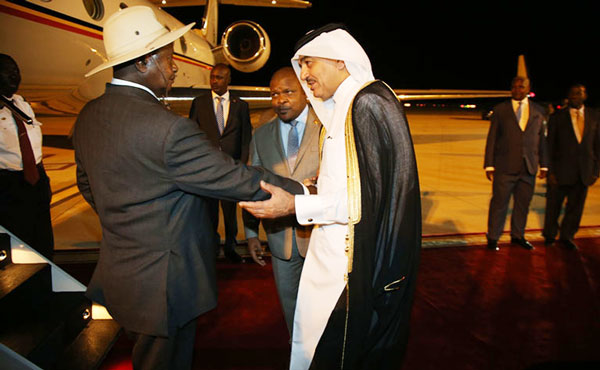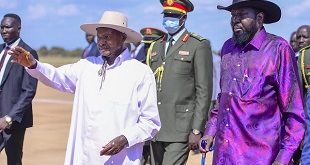
President Yoweri Museveni is in Qatar for a three day state visit at the invitation of the Emir of Qatar, Sheikh Tamim bin Hamad Al Thani.
“I will meet the Emir and other Qatari government and business officials as we seek to strengthen our countries’ business and trade relations,” Museveni said before flying out on Tuesday.
The Minister of Municipality and Environment Mohammed bin Abdullah Al Rumaihi and Uganda’s Ambassador to Qatar Yahya Rashid Ssemuddu received the president and his accompanying delegation at Hamad International Airport. (QNA)
Emir Sheikh Tamim bin Hamad Al-Thani will meet with the Ugandan president on Wednesday, at the Emiri Diwan, to review bilateral relations and means of boosting and developing them.
The President, who is accompanied by the First Lady and Minister of Education and Sports Janet Museveni, was seen off earlier at Entebbe International Airport this afternoon by the Vice-President Edward Kiwanuka Ssekandi.
Oil output cuts pressure Mideast economic growth, but Qatar bright spot
Uganda’s president visits a region that is under pressure after fall in oil prices. Uganda is preparing to enter the oil market in 2020.
First Lady @JanetMuseveni and I have left for a three-day state visit in Qatar on invitation of The Emir, H.H. Tamim bin Hamad al-Thani. pic.twitter.com/70d1sMSgEz
— Yoweri K Museveni (@KagutaMuseveni) April 18, 2017
QNA | President of Uganda to Arrive in Doha on Tuesday https://t.co/Pi2w089gYv pic.twitter.com/NzFiNWUNPl
— Qatar News Agency (@QNAEnglish) April 17, 2017
QNA | President of Uganda Arrives in Doha https://t.co/Gq1nTqltEx pic.twitter.com/XDVVKzf1hL
— Qatar News Agency (@QNAEnglish) April 18, 2017

Economic growth in Saudi Arabia and most other Arab oil exporters will slow this year following production cuts aimed at propping up energy prices, the International Monetary Fund said Tuesday.
One bright spot however is gas-rich Qatar which is expected to register 3.4-percent growth this year, compared with 2.7 percent in 2016.
In its latest World Economic Outlook report, the IMF cut its 2017 growth forecast for the region comprising the Middle East, North Africa, Afghanistan and Pakistan to 2.6 percent, down from the 3.1 percent projected in January.
“The subdued pace of expansion reflects lower headline growth in the region’s oil exporters, driven by the November 2016 OPEC agreement to cut oil production,” the Washington-based IMF said.
It “masks the expected pickup in non-oil growth as the pace of fiscal adjustment to structurally lower oil revenues slows,” the IMF added, referring to measures to cut budget deficits.
Members of the OPEC cartel of oil exporters, mostly from the region, agreed last year to reduce output by 1.2 million barrels per day from January 1 for six months, to support crude prices that had shed half of their value since mid-2014.
“Growth in Saudi Arabia, the region’s largest economy, is expected to slow to 0.4 percent in 2017 because of lower oil production and ongoing fiscal consolidation, before picking up to 1.3 percent in 2018,” the IMF said.
It said that growth is likely to dip in most Gulf Cooperation Council member states, which also include Bahrain, Kuwait, Oman, Qatar and the United Arab Emirates.
One bright spot is gas-rich Qatar which is expected to register 3.4-percent growth this year, compared with 2.7 percent in 2016. Kuwait’s economy, in contrast, is forecast to shrink by 0.2 percent.
In Algeria, the IMF sees economic growth of 1.4 percent this year, down from 4.2 percent last year.
Growth is also predicted to slow sharply in Iran, to 3.3 percent in 2017, from 6.5 percent last year when the Islamic republic won a boost from the lifting of economic sanctions.
Iraq’s economy is expected to contract by 3.1 percent in 2017 after surging by 10.1 percent last year on the back of expanding oil exports after sharp contractions in the previous two years.
QNA | Foreign Minister of Qatar Meets Ugandan Counterpart https://t.co/SgYpUIxtCN pic.twitter.com/yMJwyJ4MV6
— Qatar News Agency (@QNAEnglish) April 18, 2017
– Egypt reforms ‘to deliver’ –
The overall figure for the region overshadows a faster pace in many of its oil-importing countries.
Morocco’s economic growth is forecast to jump from 1.5 percent last year to 4.4 percent this year, while Tunisia’s economy is seen expanding by 2.5 percent compared with just one percent the year before.
On the other hand Egypt, whose currency plummeted in value after authorities floated it in November, will see slower growth of 3.5 percent this year, compared with 4.3 percent last year.
“In Egypt, comprehensive reforms are expected to deliver sizable growth dividends, lifting growth … to 4.5 percent in 2018,” it said.
The IMF, whose forecasts exclude war-torn Syria, noted that “continued strife and conflict in many countries in the region also detract from economic activity.”
Meanwhile, a “broad-based recovery is expected to continue at a healthy pace” in Pakistan, the IMF said, forecasting growth of five percent this year, and 5.2 percent in 2018, “supported by ramped-up infrastructure investment.”
*** additional reporting by AFP
 The Independent Uganda: You get the Truth we Pay the Price
The Independent Uganda: You get the Truth we Pay the Price



